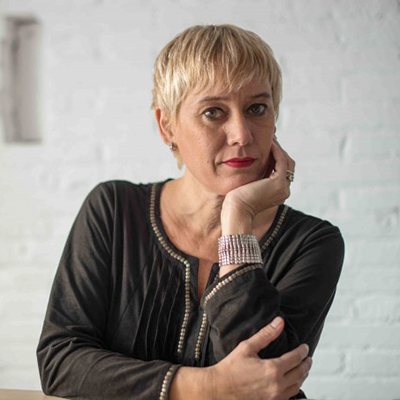Silvana Vogt
Silvana Vogt (Morteros, Argentina, 1969) studied Philosophy and worked as a radio journalist before emigrating to Catalonia in 2002. In Barcelona, after scratching a living doing different jobs, she joined the world of books by working as a publisher’s reader, a columnist for free newspapers, in radio stations and, finally, as a bookseller in Sant Just Desvern where she has opened Cal Llibreter. Her first novel, La mecànica de l'aigua, was published by Edicions de 1984 in 2016.
Abysses of the Heart
J. A. Masoliver Ródenas
Born in 1969 in Morteros, Argentina, Silvana Vogt decided to have a change of scene and came to live in Barcelona where she has a bookshop and teaches literary creation. La mecànica de l’aigua, written in Catalan, is her first novel. And it speaks with a markedly autobiographical tone of her own experiences. Nevertheless, the narrative intensity belongs in the realm of fiction or, at least, in the purely narrative domain. It is something that intensifies with the structure, in which each section of the book, significantly called an escull (reef)—and hence the book’s title—focuses on the different characters weaving the story together. The peculiar alternation of relatively long chapters with others limited to a single brief, striking sentence very vividly expresses emotional density, one of the most powerful features of the book.
In principle, the novel is narrated in third person: “I see her. I can see her”, is a leitmotif which is repeated until the surprise twist at the end, adding a new, thornier dimension. The main character, Vera, has experiences which are very similar to those of Silvana Vogt. Her view of Argentina is cliché-free and the fact that she avoids the typical “che”, “vos”, “macanudo” and “pibe” is a plus. Writing in Catalan has enabled her to shun these catch-alls. Right at the start of the book, the reader is drawn into the aberration of the corralito (freezing of bank accounts), a veritable hecatomb. The country is drifting rudderless, opting for self-destruction as a way of life, and changing presidents as if in a reality show, as the narrator puts it. Vera then decides to come to Barcelona. Where she gets the money for the trip when everything is frozen is a mystery for the people in her circle but not for the reader. She leaves the country with a compass, given to her by Fierita “so you never get lost”, the dog Kantiano (Kant is the philosopher Vera most admires and coherently champions), and a book by Federico Esperanto given to her by the author. Among the many things the novel only hints at (an added value) there is a possible tribute by Vogt to Rodrigo Fresán’s first novel, Esperanto, about a tormented young musician.
J. A. Masoliver Ródenas. “Els abismes del cor” (Abysses of the Heart – a fragment). La Vanguardia. Culturas (17 September 2016).
—Is the meta-literature appearing here your Argentine part?
—One of my obsessions was how to structure a novel, speak with two voices, how to tell the story in a way that was somehow more Catalan in style than Argentine. There, life is so out of control that we need a lot more metaphors, more exaggeration than what I believe is used here. Here, narrative is often based on the aim of telling the same stories over and over again in order to maintain culture and tradition.
—What has been the main difficulty then?
—I write the novel in Catalan but it has a tone and an Argentine way of speaking. I was worried that the reader wouldn’t get the interplay I create between my way of talking and reading and the way people have here. I wanted the book to have musicality so that it could be read like a score.
—The musical question is evident on many occasions…
—I found the music when reading Blai Bonet’s El mar. I felt unable to make the language sound the way I wanted it to until I read three pages of El mar. And Eduard Màrquez is another essential writer. And so is Lucia Pietrelli, this Italian woman who writes in Catalan and also makes the language sound different. I read a lot of poetry before starting to write La mecànica de l'aigua (The Mechanics of Water). I was aiming at a sort of love letter to the literature here. I was really worried about not finding the rhythm, the music. Blai Bonet gave me the key, but this doesn’t mean I want my language to sound like his. Reading him and reading other poets from here, I saw that I could do it.
Interview with Silvana Vogt by Anna Ballbona, El Temps (1 November 2016).




